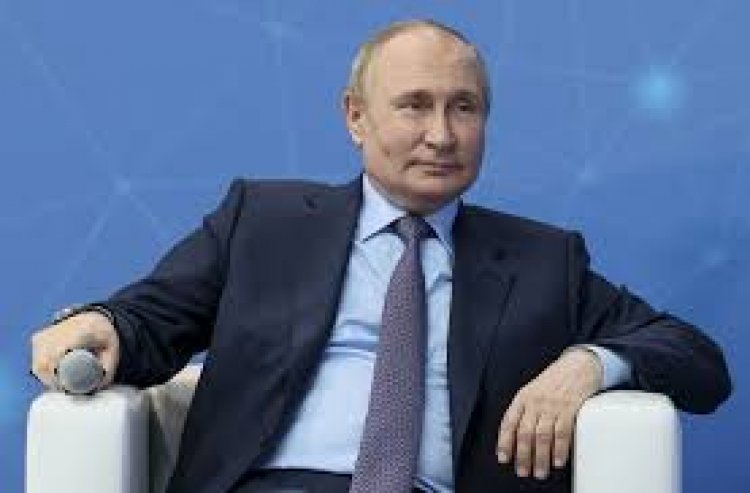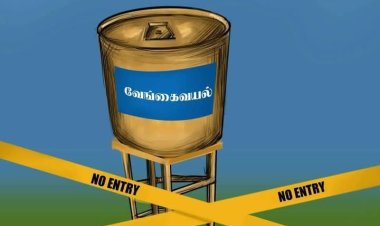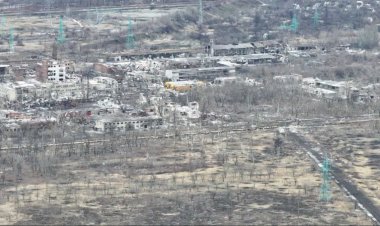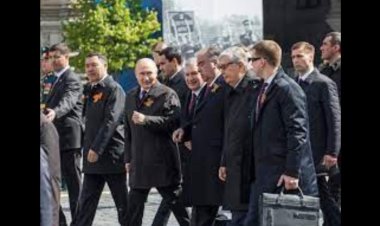Is Russia Imperialist?
The signs of the imperialist state formulated by V. Lenin in his work “Imperialism as the highest stage of capitalism” exactly coincide with the actual state of affairs.

4 months have passed since the beginning of the marked escalation in the Russian-Ukrainian crisis. This event sparked once again the long running discussion of Russia’s place in the modern capitalist world. Some people in the communist movement claim: Russia is not imperialist, and, therefore, is progressive compared to Western imperialists.
The Russian elites justify its foreign policy by resorting to epic phrases about the protection of the “Russian language” and the “Russian world”, about the “secret mission of saving Europe”, about the restoration of “historical justice” or even about “reuniting fragmented lands”.
At the same time, maneuvering between Messianism and protectionism, the Russian elite accuses the Western countries of trade and economic expansion to their “sacred and inviolable land”, then denounces “the unipolar American world”, calling all this the word “imperialism”.
Unlike the bourgeois media space, where the term “imperialism” is nothing more than a populist expression and an insult with vague content, in the theory of Marxism-Leninism it is a strictly defined scientific concept. It not only describes the policy of the capitalist state, but also indicates its form in the system of social development.
Signs of imperialism
In the book “Imperialism, the Highest Stage of Capitalism” Vladimir Lenin defines imperialism as a stage of monopolistic capital:
“If it were necessary to give the briefest possible definition of imperialism we should have to say that imperialism is the monopoly stage of capitalism.” [1].
It is worth noting that bourgeois theorists in every way seek to disown such a characteristic of modern capitalism. In particular, the famous economist J. Schumpeter even in the first third of the XX century tried to prove “the fundamental logical incompatibility of capitalism with imperialism”, calling the latter “atavism” and a “relic” of the pre-industrial era [2]. At the same time, representatives of the neoclassical trend (P. Samuelson, F. von Hayek) saw imperialism as only a manifestation of the “childhood disease” of capitalism.
Some representatives of the modern “enlightened” bourgeois intelligentsia went even further. They speak of the theory of imperialism only as a phenomenon of the turn of the XIX – XX centuries. In their opinion, the concept of imperialism is “one hundred percent anachronism” [3], which is “very poorly applicable” to modern conditions [4].
Despite this, considering a part of modern capitalist countries as imperialist does not seem to us an “anachronism” or a theoretical “dogma”, that does not reflect the actual state of affairs. In our opinion, Lenin’s theory of imperialism and monopolistic capitalism has not lost its relevance and can be applied to the analysis of modern society.
The classic definition of imperialism is the following words:
“Imperialism is capitalism at that stage of development at which the dominance of monopolies and finance capital is established; in which the export of capital has acquired pronounced importance; in which the division of the world among the international trusts has begun, in which the division of all territories of the globe among the biggest capitalist powers has been completed.” [5]
Imperialism emerged in the late XIX – early XX centuries as a result of the objective development of capitalist relations, in which free competition — characteristic of early and mature bourgeois society — is dialectically replaced by the domination of monopolies.
A striking example of an imperialist state during this period was the British Empire, which colonized most of the territory of the globe. Along with it, there was a whole scattering of other imperialist countries (for example, France, Germany, Japan), which pursued an imperialist policy on a more limited scale.
However, an imperialist state is not always a huge colonial empire. At the beginning of the XX century, the imperialist states were also the Russian Empire, Austria-Hungary, the Ottoman Empire and the Italian Kingdom.
There is competition between a huge colonial power and relatively small imperialist states, which can take place both in a relatively peaceful way and turn into a form of war. It was the competition of national monopolies and the desire to redistribute spheres of influence in the world that became the main reason for World War I.
The key features of imperialism include:
Firstly, the concentration of production and capital, which has reached such a high stage of development that it has created monopolies that play a decisive role in economic life;
Secondly, the merger of banking capital with industrial capital and the creation of a financial oligarchy on the basis of this financial capital;
Thirdly, the export of capital, which becomes more important than the export of goods;
Fourth, the formation of international monopolistic unions of capitalists dividing the world;
Fifth, the participation of the largest capitalist powers in the territorial redistribution of the world.
Having considered the essence and highlighted the key features of imperialism, we will try to correlate this with modern Russia and answer the main question: why is the Russian Federation an imperialist state?
Why is the Russian Federation an imperialist state?
Monopolies
As one of the main tasks in achieving economic security of the Russian Federation, the Russian “National Security Strategy” states “support, development and protection of competition in the Russian market, suppression of monopolistic activities and anti-competitive agreements, ensuring equal conditions and freedom of economic activity on the territory of the Russian Federation” [6]. However, in fact, the Russian economy is monopolistic.
An accurate assessment of the share of domestic monopolies in the structure of the state’s GDP is difficult at the moment, but it may well be more than 70%.
Thus, in the retail sector, the retail chains of the X5 Retail Group PC (45%) and Magnit OJSC (40%) occupy a monopoly position, which has repeatedly led to the fact of cartel collusion between them [7].
In the oil refining sector, 11 oil and gas companies (Rosneft, Lukoil, Gazprom Neft and others) provide more than 95% of total production. The Russian telecommunications market has long been divided by the “Big Four” (MTS PJSC, Megafon PJSC, Beeline, Tele2 LLC).
As for the financial sector, even the Central Bank of Russia in 2018 in its analytical report stated that the Russian banking sector is a “monopoly or oligopoly with a competitive environment” [8]. In particular, in the segment of lending and deposits of individuals, Sberbank is among the leading players in 83 out of 85 regions of the country, and VTB is in 68. In lending and raising funds of organizations, “Sber” occupies a leading position in 82 subjects, and VTB in 61. In addition, other banks — Gazprombank and Rosselkhozbank — also play a significant role in providing these services.
In the work “On the Foundations of Leninism” Joseph Stalin wrote:
“Imperialism is the omnipotence of monopolistic trusts and syndicates, banks and financial oligarchies in industrial countries” [9].
The economic activity of the so-called “natural” monopolies on the territory of Russia deserves special attention.
Such as PJSC Gazprom and JSC Russian Railways. With the light hand of bourgeois theoretical economists (J. S. Mill, J. W. Baumall, etc.), natural monopoly is recognized as a “good” monopoly. That is, a form of organization of economic activity that serves the public interest, as opposed to an artificial (or “bad”) monopoly that serves the interests of owners.
However, according to Marxist theory, there are no “good” and “bad” monopolies. Monopolies differ from each other only in the degree of their influence on state bodies, which supposedly carry out the function of regulating economic activity, although in fact they play a formal role in the “anarchy of capitalist production.” This is exactly the “role in the control of economic activity” played by the Federal Anti-monopoly Service.
A striking example of this is the recent refusal of the retail chains “O’Kay” and “Auchan Retail” (hypermarkets “Auchan” and “Atak”) from restrictions on margins on a number of goods from the list of socially significant goods [10].
Thus, the Russian economy is monopolistic in nature. This is so because the main role in the economy is played not by small and medium-sized businesses, but by large ones that use the dominant position to maximize their profits.
Some attribute monopolization solely to Putin’s role. In particular, in a series of videos by Russian blogger Andrey Rudoi entitled “Putin’s Capitalism: How Putin “Saved” Russia from the 90s” and “Putin’s Capitalism: the Underside of Russia’s Foreign Policy” the idea that the monopolization of the Russian economy and the emergence of state monopolies are a consequence of Putin’s course only is actively exaggerated. That, they say, if it were not for Putin, there would be a free market and fair competition in Russia and therefore there would be no monopolies and imperialism.
However, the process of monopolization of the economy (no matter whether it is Russia or another state) is not a subjective, but an objective process of the development of capitalist relations. The process of turning an economy with a free market and pure competition into a monopolistic one does not depend on the subjective characteristics of some individuals. It depends on the very nature of the development of social relations.
Financial Capital
Speaking about the merger of banking capital with industrial capital and the emergence of financial capital and financial oligarchy as their basis, we must point out that in relation to Russian reality, this process is carried out in two ways.
Firstly, the traditional way that appeared in world practice in the late XIX – early XX centuries was the emergence of subsidiary banks on the basis of monopolistic industrial enterprises.
Examples of such financial capital in Russia are modern Gazprombank JSC, which is a “daughter” of Gazprom PJSC, All-Russian Regional Development Bank JSC, which is a “daughter” of Rosneft NC PJSC, Otkritie Bank, which is a “daughter” of Lukoil PC.
Secondly, by creating banking ecosystems. The emergence of banking ecosystems reflects a new round of development of ways to merge capital.
Examples of such a new form of financial capital in Russia are the banking ecosystems of the bank “Sber”, “Tinkoff-Bank”, PJSC “VTB”, which include not only banking services, but also services for housing and communal services, insurance, food delivery networks, consulting, logistics, air/and railway transportation, taxis and even the film industry.
However, financial capital does not change the qualitative content of this. There is a simple replacement of one part of the economy, i.e. industrial capital, with another, i.e. the service sector, which makes up the bulk of the modern economy (55.8%) [11].
Despite the fact that representatives of the financial oligarchy put forward the slogan “The client is at the center of the ecosystem”, the already overgrown monopolistic banking sector seeks to monopolize and commercialize all aspects of human life. It seeks to control it by imposing on a person a certain system of values, at the center of which is consumption, and not the creative development of the individual.
The influence of domestic financial capital extends to industry. The result of the merging of banking capital and industry is the emergence of financial and industrial groups, holdings and conglomerates (Alfa Group, Alisher Usmanov’s structures, etc.).
Russian banks are also taking control of industrial companies. This happens both indirectly, through lending, settlement, issuance of securities and the role of brokers, and directly: through direct ownership of companies.
For example, under the management (ownership) of the bank “Sber” are the automobile company “DerWeis” and “Southern Automobile Group”. “Uralmashzavod” and “United Machine-Building Plant” are under the management of Gazprombank JSC.
Capital Outflow
The export of capital is an integral property of the imperialist state, a logical consequence of the monopolization of its economy and the emergence of financial capital in it.
In simple words, this indicator shows that financial “surpluses” arise in some economies, i.e. financial capital becomes “cramped” within the borders of its own country and it seeks to invest these funds in various forms in the economy of other countries, hoping to receive dividends from this.
At the same time, “capital outflow” should be distinguished from “capital flight”. If the first is a legal form of capital movement (direct investments abroad, state lending), then the second is illegal (tax evasion, money laundering).
To analyze this feature of the imperialist state, let us turn to statistics. According to the World Bank data for 2019. Russia ranks 31st in the ranking of countries in terms of foreign direct investment abroad.
Source: compiled by the author on the basis of data from the World Bank service [12].
Another important indicator reflecting the degree of penetration of state-monopolistic capital into other countries is the volume of public lending. According to this indicator, Russia already ranks 6th.
Source: compiled by the author on the basis of data from the World Bank service [12].
The geography of distribution of Russian investments is quite diverse.
The countries of the former Soviet Union, Syria, Venezuela, Bolivia, Central Africa and others [13; 14; 15]. Of course, in terms of its size and weight in global financial flows, the outflow of capital from Russia is significantly inferior to a number of imperialist states.
Expansion of Monopolies
The objective consequence of the export of capital from the country is the expansion of monopolies abroad.
For example, the share of the transnational monopoly Gazprom in gas supplies to Europe for 2019 was 41.1%. Along with Gazprom, other domestic monopolies, such as Rosneft, Lukoil, Uralkali, Norilsk Nickel, play an important role in the international energy market.
Another monopolist is the manufacturer of agricultural machinery, the Rostselmash group of companies, which supplies products to 50 countries, and its service network includes more than 500 facilities in different countries of the world. At the same time, the share of Rostselmash in the world market of harvesting agricultural machinery is 17%.
The expansion of domestic monopolies into foreign markets is not limited to the raw materials sector and mechanical engineering. There are monopolies that have the status of international ones, which play an important role in knowledge-intensive sectors of the economy.
For example, the share of Roscosmos Group in the global launch services market in 2020 was 14%. Rosatom State Corporation ranks first in the world in terms of the largest portfolio of orders for the construction of nuclear power plants. Largely relying on the legacy of the USSR in the military-industrial complex, the Russian Federation ranks second in the world after the United States in terms of arms exports (according to the Stockholm International Peace Research Institute – SIPRI [16]).
In addition, it is worth noting that the true expansion of monopolies is not only the struggle for markets for their resources or goods, but also the struggle for the spheres of application of their capital. Examples of the latter are the expansion of Gazprom, which is characterized by the complete subordination of the gas transportation systems of foreign countries. Moreover, the latter occurs not only in a number of neighboring countries (Belarus, Moldova, Armenia, Kyrgyzstan, until 2014 and Ukraine), but also in such states as Hungary, Serbia, Germany, Slovakia and others.
In Africa, ALROSA is developing diamond deposits in Angola and the Congo, and state corporations such as Renova Group, Rusal and MMC Norilsk Nickel are mining non-ferrous metals in South Africa, Gabon, Guinea and Nigeria. Rosneft and LUKOIL are conducting geological exploration and production of oil in Egypt, Libya, Syria, Venezuela, Colombia. Rosatom State Corporation builds nuclear power plants and is engaged in their maintenance in Belarus, Turkey, Kazakhstan, Hungary and other countries. Russian Railways is engaged in the modernization of railway infrastructure in North Korea.
Expansion of the State
If monopolies and financial capital do not meet any resistance in the domestic market, plunging the domestic economy into the path of “rotting” and “parasitism”, then in the international arena they face fierce competition from their foreign opponents.
Pure competition for the right to exploit mineral resources and peoples develops into trade wars, is overshadowed by a tough sanctions policy, and the introduction of a financial and trade embargo. The extreme form of this struggle of conflicting interests of capital has always been war.
That is why the struggle of the Russian Federation against the United States for the Nord Stream-2 should be considered as a struggle for the markets of hydrocarbon resources. It should be considered as a struggle between the monopolies of Gazprom, on the one hand, and Cheniere Energy, Inc., as well as Kinder Morgan, Inc., on the other.
The actions of the Russian Federation in Syria or support for the Maduro government should be considered as a struggle for cheap oil. “The struggle against fascism in Ukraine” as a struggle for the market for its products, for cheap labor resources, for the possibility of exploiting its subsoil with the EU and the USA.
Proceeding from this, under the pretext of protecting the Russian-speaking population and opposing fascism, domestic monopolies seek to return the dominant position to their capital in the “fraternal country”. And this is not surprising. After all, until 2014, Ukraine was the main borrower of Russia’s capital.
It is the protection of monopolies and their dominant position in the “colonies” of the near and far abroad that is the main reason for the intervention of the Russian military forces. For example, since 2014, the Wagner PMC has participated in conflicts in Eastern Ukraine, Syria, Libya, overthrew unwanted rulers in the CAR, Mozambique, Mali.
During the protests in 2021 in Belarus, Russia sent employees of the Rosgvardiya there. During the January protests in Kazakhstan in 2022, Russia and the CSTO countries sent a limited contingent there.
Thus, at the stage of imperialism, the state turns into a servant of monopolies and financial oligarchy.
The state uses diplomacy and political pressure, promoting the aggressive and private-propertied interests of the domestic bourgeoisie abroad. The state creates economic and customs unions with only one goal: to demolish borders and freely exploit its economic “partners” and “allies”.
It is important that in such a situation, it is not the state or the people that seizes new territories, restores “historical justice” or collects “fragmented principalities of the empire”, but private capital, monopolies seize new resources, new markets for their goods and new slaves of the capitalist regime by someone else’s hands, by the hands of ordinary workers.
The position of some “leftists” deserves special attention in the question of Russian imperialism, its essence and causes.
In particular, the theorists of the “Workers’ Party of Russia”, headed by Professor M. Popov, are strictly convinced that the Russian Federation is not an imperialist state.
We have already touched upon the moment of Popov’s denial of imperialism in Russia in a specially dedicated article [17]; here we would like to repeat the main points of our criticism.
As the main arguments they put forward the following theses:
Monopolies in Russia are a forced measure;
There are no banks in Russia, but only “usury offices”;
If there are no banks, then there is no financial capital.
Despite our criticism of Popov’s position, expressed back in 2019, M. Popov and his theorists continue to persist in their ignorance [18].
In a pompous video message to the working class of Ukraine, M. Popov, when assessing the military special operation, used his favorite, reinforced concrete argument “forced measure” [19]. The article by another representative of this “left” movement, I. Kotran, “Denazification Operation. The position of Lenin and the Left” repeats the long-familiar position that “the Russian Federation is not an imperialist power” [20].
The development of such a revisionist and renegade view was the position of Popov and Co. on the special operation in Ukraine.
According to them, Russia is “an anti-fascist state that is fighting American fascism for export,” namely, with one of its “springboards for attacking Russia” (i.e. Ukraine) [21].
Popov’s condemnation of the policy of American imperialism resembles the position of Menshevik A. Pospelov in condemning Kautsky. In this matter, Popov, like his renegade ancestor, speaks “not as a Marxist, but as a Russian chauvinist,” arguing that “the internationalism of the modern proletariat is compatible with the defense of the fatherland” [22].
Vladimir Lenin spoke about the class reasons for this position more than a hundred years ago:
“Social chauvinists are our class opponents, the bourgeois among the working-class movement. They represent a stratum, groups, and layers of workers who have been objectively bribed by the bourgeoisie (the best wages, places of honor, etc.) and who help their bourgeoisie to plunder and strangle small and weak peoples, to fight over the division of capitalist spoils” [23].
Conclusion
Russia is an imperialist state.
The signs of the imperialist state formulated by V. Lenin in his work “Imperialism as the highest stage of capitalism” exactly coincide with the actual state of affairs.
Of course, imperialism itself has transformed in a hundred years. New forms of capital export appeared, new forms of financial capital itself, the colonial system disappeared. However, the essence has not changed.
The essence of imperialism is that the era of financial capital and monopolies everywhere brings domination, ruin and impoverishment, and not freedom, democracy and security. The extreme form of imperialism is war, during which the financial oligarchy seeks to annex territories, thereby calling into question the principle of national independence and self-sufficiency.
What is characteristic: this war is always waged by the hands of ordinary people, ordinary workers. Military oppression and impoverishment also falls on ordinary workers. The workers, guided by bourgeois ideology, destroy the workers. However, the results of this victory always end up in the hands of monopolists and financial oligarchy.
At the same time, the increase in the impoverishment of the population, the increase in the reaction in the political space, the restriction of all freedoms are evidence of the growing contradictions in the life of society.
The dialectic of social development teaches that development always occurs through the struggle of contradictions. Through the contradictions generated by the imperialism of the Russian Empire in October 1917, the workers’ state was born. That is why, speaking about the results of the imperialist policy of states, Joseph Stalin wrote in the work “Reserves of Imperialism”:
“The inevitable result of the imperialist policy of masked intervention will be that it will draw the “small” nations into the sphere of the revolution and extend the base of socialism.” [24].
Thus, imperialism is not a historical vestige and a polemical cliché used at the turn of the XIX – XX centuries. Imperialism is the reality in which the modern proletariat lives.
However, the laws of historical development are immutable. Sooner or later, the workers of the whole world will rise up again to fight against world imperialism, will rise up again to fight for a bright future.
In order to put this into practice, all workers need:
1. To study Marxist theory and creatively generalize the teachings of Marxism-Leninism in relation to the new realities of public life.
2. To fight against all kinds of opportunism and revisionism in the left movement.
3. To organize for joint work on the principles of democratic centralism and the strictest discipline.
Every worker should clearly realize that the strengthening of imperialism, the flourishing of imperialism and its march with a broad stride around the world is, first of all, the growth of the struggle of the proletariat and its victory in the end.
Disclaimer: This page expresses the views of the author. We publish it on this site for discussion
– Senthalam news section












